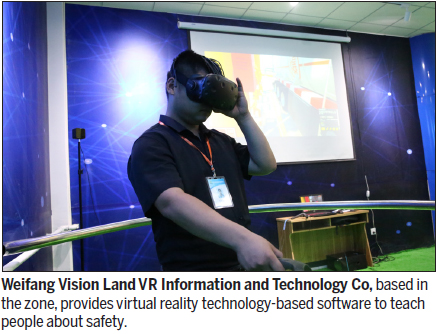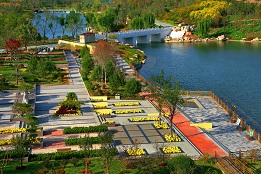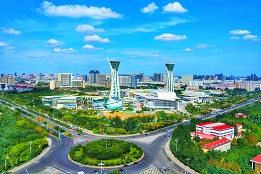Virtual reality used to educate people on how to react in emergencies

A facility for people to learn about how to deal with emergency situations in industrial production was established in the Weifang Hi-tech Industrial Development Zone in June.
Weifang Vision Land VR Information and Technology Co, a startup launched by Wei Zheng and his business partner Han Yizhen, is taking on the role as the technology developer.
The virtual reality technology-based software not only helps people to detect the hidden hazards in scaffolds, but also helps to teach people more about scaffolding and evaluate whether a new staff member has sufficient safety knowledge about them.
"We're different from boring, traditional safety training courses," Wei said.
"Our VR technology-based solution makes people engage in an immersive environment, which is really similar to the real world."
More importantly, Wei's software can also be used to teach people how to escape from such emergencies as earthquakes, fires and explosions.
"People may have only one chance to escape in those incidents, so it is necessary to create opportunities to practice in an immersive environment," Wei said.
Wei started his career in a film and television production company in South Korea in 2014. VR technology was booming a few months later, according to Wei.
Wei had a strong passion for new technologies and believed VR would play a vital role in helping to drive economic development.
He quit his job and spent a year learning about VR technology in South Korea.
Wei registered his business in June last year with his best friend Han and decided to focus on software development.
The new company was based in the zone and in the wake of a boom experienced by China's VR industry, it has experienced strong growth.
To date, Wei and Han have developed more than 20 types of software to serve different market needs.
They have partnered with many companies and organizations in Shandong province, including a fire fighting center in Xuzhou and Huadian Weifang Power Generation Co.
Wei said they decided to settle in the zone not only because rental and utility costs are lower, but also because they can enjoy better service and a better business environment.
The zone provided many supporting policies for them, according to Wei. He said that one example was that the zone's human resource management center provided suggestions on their presentation before they participated in a startup competition.
Looking ahead, Wei said they will pay closer attention to the education sector and focus on developing products related to kids, as well as occupational and safety education, to bring the benefits of the cutting-edge technology to more people.
Yin Tingting contributed to this story.




